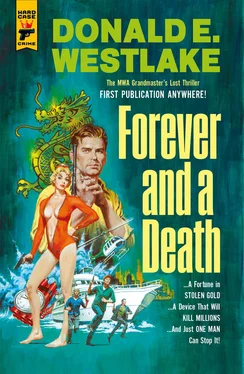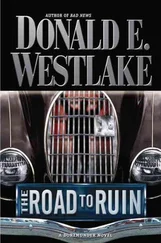“We’ll soon know,” Luther said.
They got off the bus at Esplanade Park and crossed to Empress Place, a large open-air pedestrian area overlooking the Singapore River. The sprawling hawker center nearby was open-air, with booths and stalls for the food vendors and many tables, some in dappled shade, many in direct sun. The place was crowded and busy, but they soon found a table.
Luther looked at his watch. “Twelve-thirty exactly,” he said, “I’ll tell you the truth, Kim, I’d like it if he would show up this time.”
“You think he might not?”
“I was sure he’d appear last night,” he said, “and I was wrong.”
They ate, ordering food from three different stalls, and the food was all good. But where was Mark? They’d taken their time, and here they were, finished, and here Mark wasn’t. Their only choice, Jerry said, was to wait, to give him, say, an hour. Though that hadn’t worked the last time.
Kim said, “I’m going to wander,” choosing the word deliberately, and got up before either of the men could tell her not to. “I won’t go far, I promise, and I won’t be away long. And if I see your friend’s here. I’ll come right back.”
There wasn’t much they could do but look dubious, which they did, and which she ignored. She got up and roved among the stalls and the many people eating their lunches. Beyond the hawker center, the city itself from here looked serene, the tall new glass office blocks rising smoothly among the old colonial-era buildings, the traffic sweeping by on the Anderson Bridge, the river endlessly flowing, the white Empress Place Building massive without being intimidating. She walked among the crowds for about five minutes, and was away from the hawker center entirely, over by the Empress Place Building, when a young man, Caucasian, slender, in white shirt and dark slacks, stopped in front of her, and said, “Here.”
Automatically, she took the folded piece of paper, and he hurried around her and off. When she turned, astonished, to call after him, he was walking briskly away toward Cavenagh Bridge.
She looked at what he’d handed her and it was a sheet of white paper, folded twice. A note.
That was Mark! She was convinced of it. That was Mark, and in her hand was the explanation for his continuing non-appearance.
She thought, I should bring this back to Jerry and Luther. Then she corrected that thought: I should read this, and then bring it to Jerry and Luther.
There were benches along the pedestrian path in front of the Empress Place Building. Kim found a free spot, sat down, looked around, saw nothing unusual — what would be unusual? what should she look for? — and unfolded the paper.
It was letterhead, Richard Curtis’s letterhead, which startled her. RC STRUCTURAL it said across the top, with the Singapore office address and phone numbers and fax numbers and e-mail address. Handwritten in the middle of the page in neat small script was: “Jerry, you are being followed by a man from Curtis. In fifteen minutes, take the #167 bus south. Be sure you’re the last ones on the bus. M.”
Her hands were trembling when she refolded the paper. She stood, feeling suddenly awkward, and stuffed the paper into her jeans pocket. It was as though she had stage fright, this sudden self-consciousness. She’d forgotten how to walk normally, and it seemed to her she lurched like some not-well-made robot as she made her way back to the hawker center and the two men at the table.
“Well, there you are,” Jerry said, but Luther had looked at her face, and he said, “What is it, Kim? What happened?”
Wordlessly, she handed Luther the folded paper, then sat down. Luther opened it, and Jerry leaned close to his shoulder so they could both read it. “No reaction, Jerry,” Luther said quietly, not looking up. He refolded the paper and pocketed it.
Kim could see that Jerry wanted to react all over the place, but all he did was look wide-eyed at Kim and say low, as though not to be overheard, “ Mark gave you that?”
“It must have been him,” she said. “He just stopped in front of me, handed me the note, and went right off. I didn’t have a chance to say a word to him.”
Jerry said, “I don’t see what the point is in taking a bus . If somebody’s following us, they can certainly follow a bus.”
Luther said, “I’m sure Mark has something in mind.”
“But what? He doesn’t even say where to get off the bus.”
“We’ll find out,” Luther said. “Come on.”
The #167 bus was crowded enough to have standees, but they weren’t all jammed tightly together. Kim and Jerry and Luther stood in a group, holding on as the bus swayed down Collyer Quay, and it seemed unlikely to Kim that any of the obvious tourist types on the bus could be the person who was following them. So, had they gotten away?
The bus made another stop, and among the people who got on was the young man who’d given her the note. He looked around, not appearing to recognize them at first, and she noticed that Jerry and Luther also remained deadpan. Then he came toward them and stood near Jerry. “Why don’t you all cluster around me?” he asked quietly.
They did, and Jerry said, “Where is he?”
“In a taxi, following the bus.”
“Jesus, Mark,” Jerry said. “So where can we meet?”
Mark grinned at him. “We are meeting, Jerry. This is it.”
“Very clever,” Luther said. “May I introduce Kim Baldur. Kim, this is Mark Hennessy.”
They exchanged nods, and then Luther said, “How do you know it’s somebody from Curtis?”
“Yesterday morning,” Mark said, “Mr. Curtis’s secretary had me carry five thousand dollars in cash to Mr. Curtis in the small conference room. There was a man in there with him, I just got a quick look at him and I don’t think he noticed me at all. Last night, I was about to go into the bar to meet you two, and I saw the same man in a car parked just down the block. Today, I saw you arrive, and the same man was behind you.”
“Hired by Curtis,” Luther said.
“It would seem that way.” Mark Hennessy was an American, Kim was pretty sure, but he’d been away from the United States long enough for his accent to begin to slip, to move into something more general and foreign, with traces of Britishness. He said, “It’ll be easy to pick him out. He’s a bulky man, Eurasian, and he’s carrying a Polaroid camera.”
Kim said, “A Polaroid!”
Jerry said, “Mark, he’s staying at our hotel.”
“Then he’s probably tapped your phones,” Mark said. “Which would explain why he knows what you’re going to do.”
The bus trundled along, now leaving Raffles Quay and starting down Shenton Way. Passengers got on and off, and Jerry kept his voice low, but Kim could hear the stress in it. “Mark, we can’t keep meeting on buses all the time.”
“Well, the fact is, we don’t have to,” Mark said. “I don’t have that much to report. The main thing going on now in the office is the preparations for Kanowit Island, the construction and all that.”
“Curtis is planning something else,” Luther said, “something much worse. We just don’t know what.”
“Something to do with the ocean,” Jerry said. “There’s a destructive ocean wave he can make.”
“Same as at Kanowit,” Mark said, and shrugged. “Haven’t a clue,” he said. “I’ll tell you, though, he had a visitor from Hong Kong this morning.”
Luther said, “Really? I thought he’d burned all his bridges to Hong Kong.”
“This is a labor thug called Jackie Tian,” Mark told them. “He and Curtis were tight in the old days, in Hong Kong. I doubt Tian has any influence anywhere else.”
Luther said, “You think Curtis is planning something around Hong Kong? He does have a grudge against them, god knows.”
Читать дальше







![Дональд Уэстлейк - Enough [A Travesty (novel) and Ordo (novelette)]](/books/416846/donald-uestlejk-enough-a-travesty-novel-and-or-thumb.webp)
